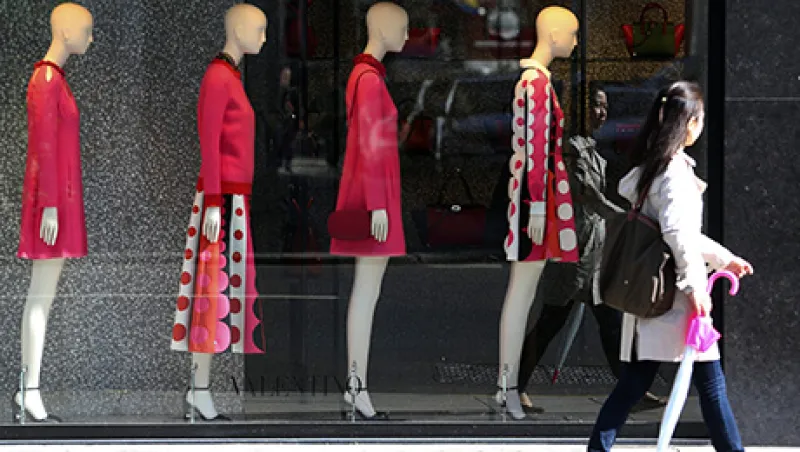Alibaba executive chairman Jack Ma may be king of hill when it comes to selling mass merchandise online in China, but French businessman Thibault Villet is the man to talk to when it comes to designer goods.
Villet is co-founder and CEO of Glamour Sales China, one of two arms of Glamour Sales Holding, an online retailer that sells everything from Dolce & Gabbana handbags to Fendi pumps and Lancôme cosmetics to consumers in China and Japan. Sales, which totaled $82 million in 2013, are expected to exceed $150 million this year.
Glamour Sales’ “flash sales” approach — selling brand name goods at steep discounts of up to 90 percent for limited durations — has been such a hit that the company has signed up more than 6 million registrants in China and 1.3 million in Japan. “We have a lot of repeating customers,” says Villet.
Here’s how the flash sales work: Beginning every day at 9 a.m. and 9 p.m in China and at 8 p.m. in Japan, Glamour Sales web sites — Mei.com in China and Glamour-Sales.com in Japan — introduce sales events on thousands of items of merchandise from ten to 20 major brands, ranging from Armani, Calvin Klein and Dolce & Gabbana to Diesel, Reebok and Lancôme. “Customers then enter the race to snap up deals,” says Villet. Although the sales can run as long as seven days, some expire in a matter of minutes, depending on demand. On one recent morning, Mei.com’s offerings included Hugo Boss bedding, Thomas Pink women’s and men’s casual clothing, Jurlique skin lotion and Longchamp handbags.
Designer brands, which are usually vigilant in controlling their retail distribution, are happy to work with Villet’s company because it reaches secondary Chinese markets where they have little or no presence. In addition, most of the items on offer are older styles. Glamour Sales effectively acts as an online clearance sale, enabling the brands to unload end-of-season or older inventory while maintaining a sense of exclusivity among members.
“We are the only web site in Asia to operate as a direct partner for luxury brands and their official distributors, which means the products we put up for sale are genuine and not fake or counterfeit,” says Villet.
In April Hong Kong luxury retailer Chow Tai Fook Enterprises and London-based asset manager Investec injected a total of $65 million in the company for an undisclosed stake. At the same time, however, Neiman Marcus Group, which had invested $28 million for a 44 percent stake in 2012, exited Glamour Sales because the company had failed to sell Neiman Marcus’s goods at full price, as the Dallas-based retailer had hoped.
Alibaba’s record $25 billion initial public offering in September provided dramatic evidence of the potential of the Chinese market. According to a study by accounting and consultancy firm KPMG, e-commerce transactions in China could reach $540 billion in 2015, or 7.5 percent of the country’s total retail spending. It also forecast that China’s e-commerce market would be larger than those of the U.S., U.K., France, Germany and Japan combined by 2020. China’s online retail sales have been growing at a rate of more than 70 percent a year since 2009; they hit 1.3 trillion yuan ($211 billion) in 2013, vaulting China ahead of the U.S. as the world’s largest digital retail market, according to Bain & Co.
“Many Chinese consumers travel from the mainland to Hong Kong or the U.S. and Europe to purchase luxury goods, where prices are typically lower, but they are also increasingly turning to the Internet in search of better deals,” Villet says. Designers tend to sell merchandise at higher prices in Chinese shops than in Hong Kong or other markets.
Convenience and access to branded goods are the biggest driver of sales, though, Villet says. “We deliver to 1,200 cities in China,” he says. Sixty percent of Mei.com’s sales go to customers in China’s so-called second- and third-tier cities, urban areas in the country’s interior where most global brands have yet to open outlets.
China has other websites offering flash sales, but most involve mass merchandise. The average sale at Mei.com is roughly 800 yuan, compared with 200 yuan or less at rival sites, Villet says.
The company expects to generate more than half of its sales in China this year, with the rest coming from Japan. “If you compare the size of the luxury online market, the Chinese market in the past two to three years has become bigger than Japan,” Villet says. But competition is also greater in China, he notes. “In Japan there are only two to three rivals,” he explains.
Retailing has changed significantly since Villet first entered the industry in the 1990s. As a young retail executive, he helped French cosmetics giant L’Oréal distribute at major airport outlets in the U.S. He moved to Asia in 1999 for L’Oréal and introduced brands such as Lancôme, Helena Rubinstein and Shu Uemura into China and later into Japan. He jumped to Coach from 2007 to 2009, where he oversaw the China, Hong Kong and Taiwan markets and implemented a strategic shift away from distributors to sales in company-owned stores.
Believing that the new retailing frontier was online, Villet teamed up in 2009 with two French entrepreneurs active in China, Olivier Chouvet and Alain Soulas, to launch Glamour Sales’s Chinese unit. The trio began with their own funding and some venture capital that in total amounted to $13 million. Since then, the holding company, which has headquarters in Hong Kong and employs 260 staff in Shanghai and 150 in Tokyo, has gone through two rounds of fundraising, garnering more than $100 million.
Villet is optimistic about the future. Glamour Sales should achieve operational profitability in 2015, he says. “We have in mind an IPO, but there is no timeline,” he adds.
Glamour Sales has every reason to be optimistic. China’s e-commerce market is vast and still growing, says research firm Nielsen Co. China has 604 million netizens. A large portion of Chinese online shoppers have annual incomes in the range of 100,000 yuan to 150,000 yuan, or three to four times China’s per capita gross domestic product, according to the research firm.
“Still, Chinese consumers tend to be more value conscious,” says Yan Xuan, Shanghai-based president of Nielsen in the Greater China area. “They are emerging consumers; they are just getting the income and cash to spend. They want to make sure they get the most bang for the buck.”
Thibault Villet is happy to oblige.
Follow Allen Cheng on Twitter at @acheng87.






